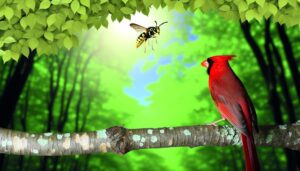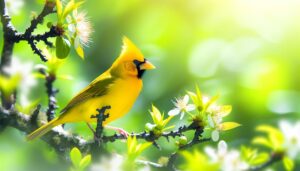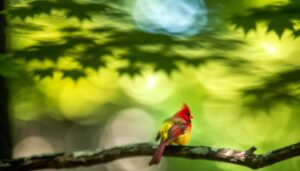Do Yellow Cardinals Eat Basil in Their Diet?
Yes, yellow cardinals do eat basil. Their diet primarily includes seeds, insects, and fruits, but they've been observed consuming basil leaves.
Basil offers essential vitamins like A, C, and K, as well as minerals such as calcium and iron, contributing to a balanced diet. Its antioxidants also help combat oxidative stress in birds.
However, it's important for yellow cardinals to eat basil in moderation to avoid digestive issues. Evidence from various habitats supports basil's significance in their dietary patterns.
For those interested in attracting yellow cardinals or understanding more about their diet, there's valuable information ahead.
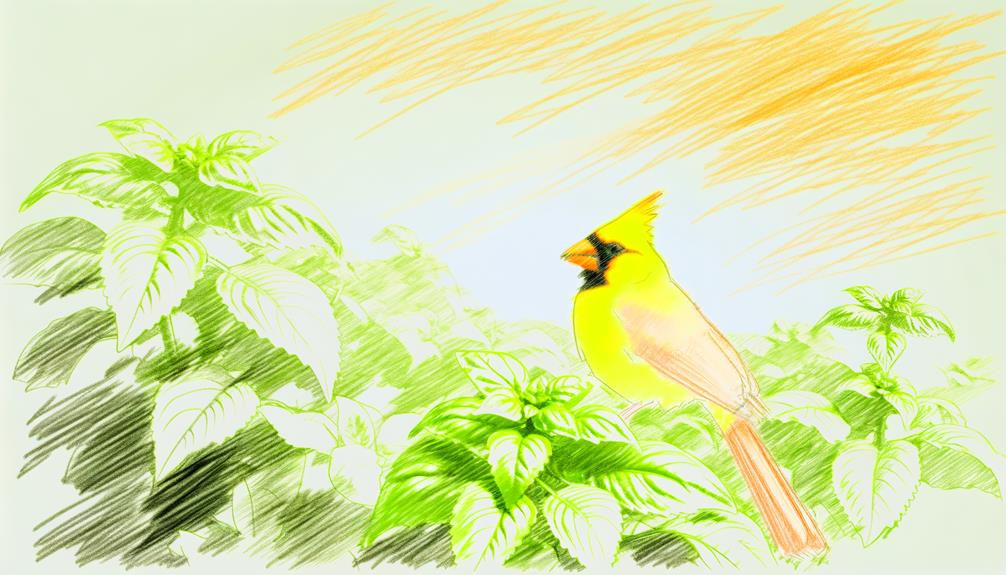
Key Takeaways
- Yes, yellow cardinals have been observed consuming basil leaves in various habitats.
- Basil is rich in vitamins A, C, and K, beneficial for yellow cardinals.
- Basil also provides essential minerals like calcium, magnesium, and iron.
- Moderation in basil consumption is crucial to prevent digestive issues in yellow cardinals.
- Basil contributes to a balanced diet, supporting yellow cardinals' metabolic functions and immune responses.
Yellow Cardinal Diet
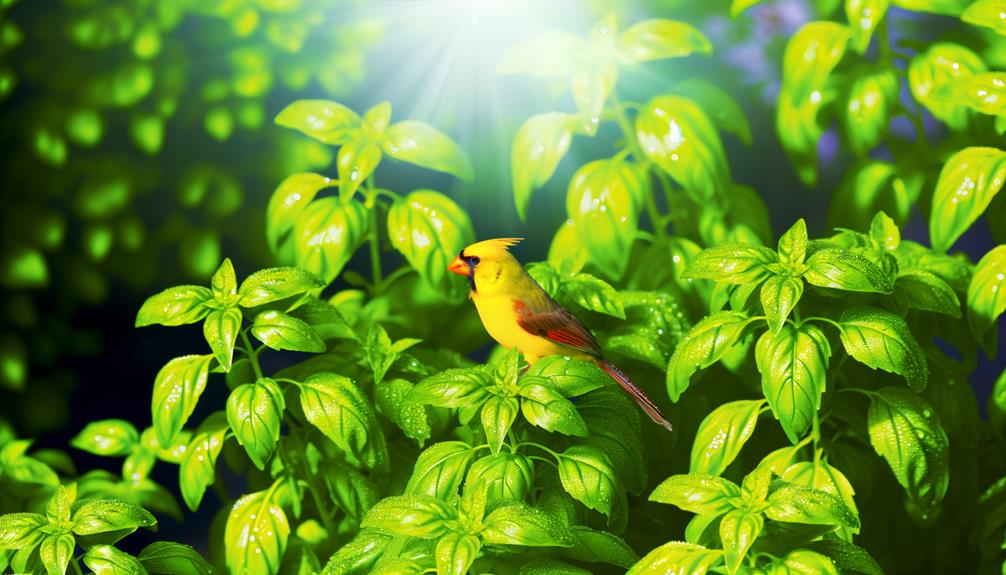
Yellow cardinals primarily consume seeds, insects, and fruits, which provide the necessary nutrients for their survival and reproduction. Their diet consists mainly of seeds from grasses and weeds, which are rich in carbohydrates and fats.
Insects, including beetles and caterpillars, offer proteins essential for growth and feather maintenance. Fruits, often berries, supply important vitamins and antioxidants. This varied diet guarantees that yellow cardinals get a balanced intake of macronutrients and micronutrients.
During breeding seasons, they increase their insect consumption to meet the higher protein demands. By adapting their diet to seasonal availability, these birds maximize their nutritional benefits. Their feeding behavior showcases a dynamic interaction with their environment, ensuring their continued health and wellbeing.
Basil in Bird Diets
Examining the inclusion of basil in bird diets reveals its significant nutritional value, including essential vitamins and minerals.
Various bird species exhibit preferences for different herbs, with some favoring basil.
Ensuring safe basil consumption involves understanding appropriate quantities and potential impacts on avian health.
Nutritional Value of Basil
Basil's rich array of vitamins, minerals, and antioxidants can greatly enhance a bird's diet, providing essential nutrients that support overall health and well-being. This herb contains vitamins A, C, and K, which are vital for maintaining strong immune systems and promoting proper growth and development.
Additionally, basil is a source of essential minerals like calcium, magnesium, and iron, contributing to bone health and metabolic functions in birds. The antioxidants present in basil, such as flavonoids and polyphenols, help combat oxidative stress and reduce inflammation.
Including basil in a bird's diet can offer a variety of health benefits, ensuring they receive a well-rounded and nutrient-dense dietary supplement.
Birds' Herb Preferences
Considering the robust nutritional profile of basil, it's intriguing to explore how different bird species, such as yellow cardinals, incorporate this herb into their diets and exhibit distinct herb preferences. Basil offers vitamin K, vitamin A, and essential minerals, making it a potential dietary supplement for birds. Observations indicate that while some birds are attracted to basil's aromatic leaves, others may prefer different herbs.
| Bird Species | Herb Preference |
|---|---|
| Yellow Cardinals | Basil, Dill |
| House Sparrows | Parsley, Mint |
| European Starlings | Oregano, Thyme |
These preferences suggest a complex interaction between a bird's nutritional needs and the availability of herbs in their habitat. Understanding these patterns can aid in enriching avian diets in captivity and the wild.
Safe Basil Consumption
Guaranteeing the safe consumption of basil for yellow cardinals involves understanding the herb's nutritional composition and potential effects on avian health. Basil contains vitamins A, C, and K, along with essential minerals like calcium and iron. These nutrients can benefit birds by supporting their immune system and bone health. However, moderation is key, as excessive basil intake might lead to digestive issues.
It's essential to offer basil as part of a varied diet to secure balanced nutrition. Additionally, avoiding pesticides and contaminants on the basil is crucial. Yellow cardinals should have access to clean, fresh basil to maximize health benefits. By integrating basil safely, bird enthusiasts can provide a nutritionally rich and diverse diet for their feathered companions.
Observations and Studies
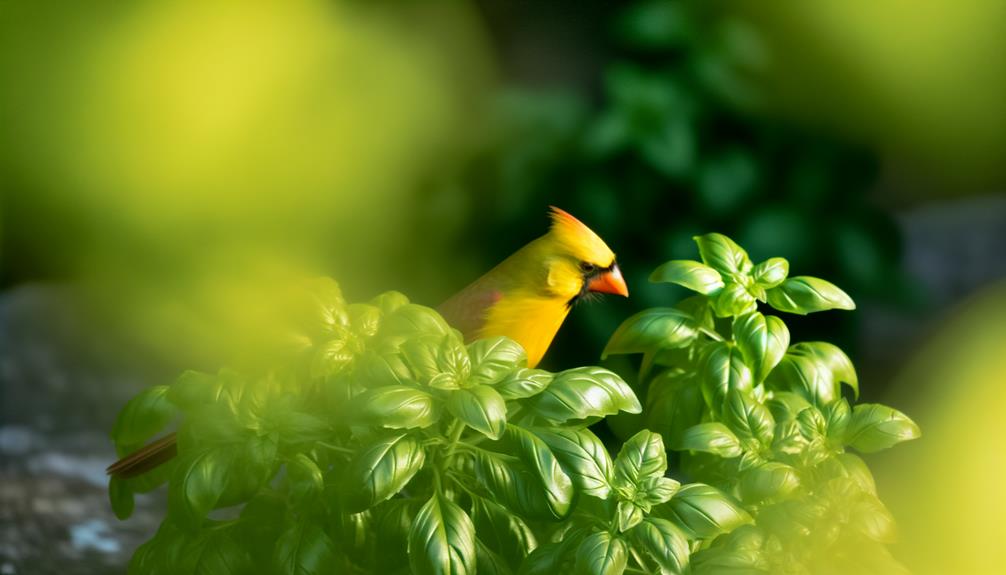
Recent field observations have documented yellow cardinals frequently consuming basil leaves in various habitats. Researchers have noted this behavior in both urban gardens and natural settings, suggesting a widespread dietary preference.
Systematic studies have recorded the following key points:
- Feeding Patterns: Yellow cardinals nibble basil leaves primarily during early morning hours.
- Habitat Variety: They exhibit this behavior in diverse locations, from suburban backyards to rural farmlands.
- Frequency: The birds were observed eating basil leaves multiple times in a single day.
- Social Behavior: Instances of multiple yellow cardinals feeding on the same basil plant have been recorded.
These findings underscore the importance of basil in the diet of yellow cardinals and highlight intriguing behavioral patterns worth further investigation.
Nutritional Needs
Understanding the nutritional needs of yellow cardinals is crucial for comprehending why these birds are increasingly incorporating basil into their diet. Yellow cardinals require a balanced intake of proteins, fats, vitamins, and minerals to maintain excellent health. Seeds and insects traditionally constitute their primary food sources, providing essential amino acids and fatty acids.
However, basil introduces a variety of beneficial compounds, including vitamins A, C, and K, as well as calcium and iron. These nutrients support metabolic functions and bolster immune responses. Additionally, basil's phytochemicals may offer antioxidant properties that aid in cellular protection.
Attracting Yellow Cardinals
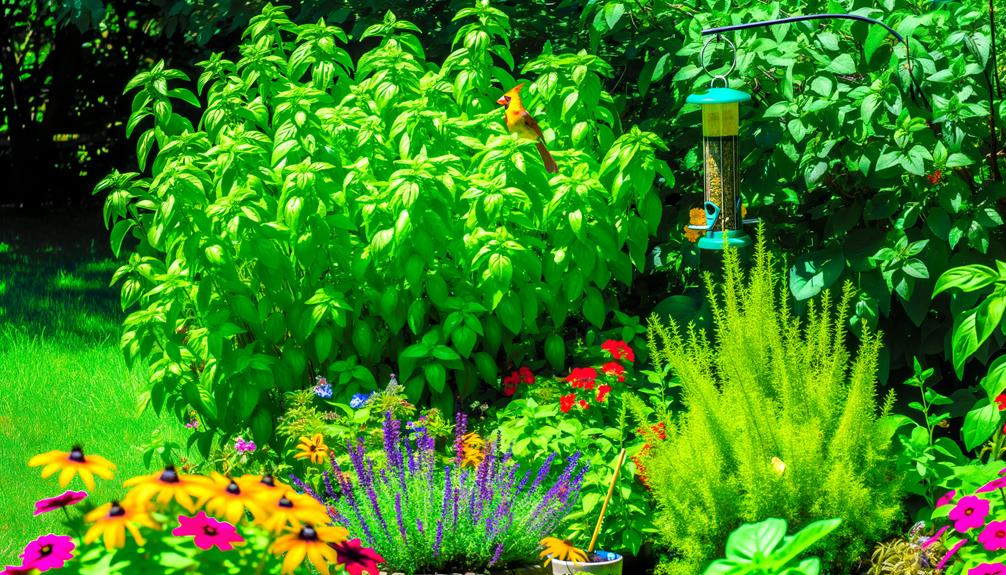
To attract yellow cardinals, one must consider providing appropriate food sources such as seeds and insects.
Additionally, creating ideal bird habitats with dense shrubs and low-lying trees is essential.
These elements together guarantee that yellow cardinals find a supportive environment for feeding and nesting.
Suitable Food Sources
A diverse diet abundant in seeds, fruits, and insects is vital for attracting and sustaining yellow cardinals in a garden habitat. These vibrant birds require a variety of food sources to meet their nutritional needs and guarantee their health.
- Seeds: Sunflower seeds, safflower seeds, and millet are particularly favored, providing essential fats and proteins.
- Fruits: Offerings of berries, such as blackberries and blueberries, supply necessary vitamins and antioxidants.
- Insects: Caterpillars, beetles, and grasshoppers are essential for protein intake, especially during the breeding season.
- Nuts: Crushed peanuts and tree nuts can be excellent supplementary food sources, providing minerals and additional protein.
Ideal Bird Habitats
In addition to a varied diet, creating an ideal habitat featuring dense shrubs, native plants, and accessible water sources is key to attracting yellow cardinals to a garden.
Dense shrubs provide essential cover from predators and nesting opportunities. Native plants support local insect populations, which supplement the cardinals' diet. Including berry-producing shrubs offers a reliable food source.
Water sources, such as birdbaths or small ponds, should be clean and accessible, ensuring hydration and bathing opportunities. Avoid using pesticides, as they can harm the birds and reduce insect availability.
Protecting Garden Herbs
Gardeners can employ various strategies to safeguard their basil and other herbs from yellow cardinals and other herbivores. Effective methods include physical barriers, natural repellents, and strategic planting.
- Netting and Fencing: Installing fine mesh netting or small fences around herb beds can physically prevent birds and other animals from accessing the plants.
- Natural Repellents: Spraying herbs with solutions made from garlic, chili, or other strong-smelling substances can deter herbivores without harming the plants.
- Companion Planting: Growing herbs next to plants that naturally repel birds, such as marigolds, can offer additional protection.
- Garden Maintenance: Regularly removing fallen seeds and debris can minimize attractions for foraging birds.
These approaches maintain herb health while allowing gardeners to enjoy their freedom to cultivate diverse plant species.
Alternative Food Sources
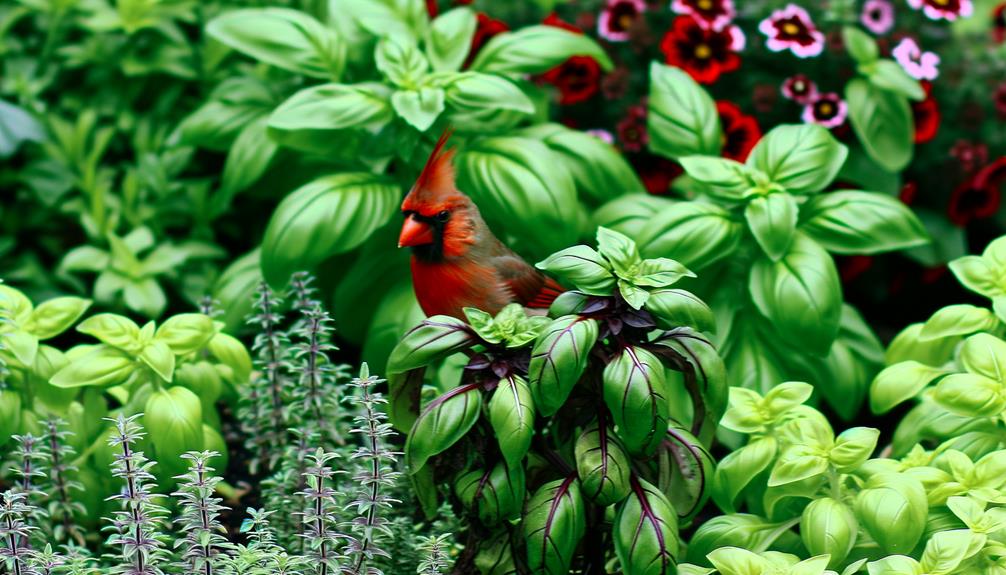
To mitigate the impact of yellow cardinals on basil plants, providing alternative food sources can effectively redirect the birds' attention. High-energy seeds like sunflower or safflower seeds are particularly attractive to cardinals. Placing feeders stocked with these seeds around the garden can draw the birds away from herb beds.
Additionally, offering fruits such as berries or apple slices can diversify their diet and further reduce their interest in basil. Suet cakes, which provide essential fats and proteins, also serve as an enticing option. Implementing these alternatives not only protects basil but also promotes the well-being of the yellow cardinals by ensuring they receive a balanced diet.
This approach fosters a harmonious coexistence between gardeners and these vibrant birds.
Conclusion
Although yellow cardinals don't typically eat basil, including this herb in your garden won't deter these vibrant birds. Studies show they prefer seeds and insects, aligning with their nutritional needs.
If you're looking to attract yellow cardinals, consider offering sunflower seeds or mealworms. Some might worry about protecting their basil, but rest assured, its inclusion won't disrupt the cardinals' diet.
Instead, focusing on alternative food sources can enhance your bird-watching experience without compromising your garden herbs.


